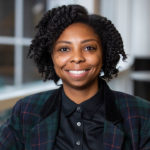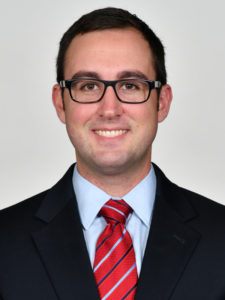By Kara Sherrer
Business schools are eager to build diverse student bodies, which include LGBTQIA+ applicants, or those who identify as lesbian, gay, bisexual, transgender, and/or queer. For LGBTQIA+ MBA candidates who are out, there are many resources — both national and local — available for those looking for support and a community within the business world.
To find out what LGBTQIA+ applicants should know, we sat down with Lead Diversity Recruiter Ashley Lomax, as well as Taylor Kunkel and Chad Fritzsche (both MBA’19), who are involved in the Out & Allied club at Vanderbilt Business; Kunkel was the 2018-19 president. They covered what MBA applicants should know from both the admissions and student perspectives as they research and apply to programs.
Reaching Out MBA is a great resource.

Taylor Kunkel (MBA’19)
Reaching Out MBA (ROMBA) has been educating, inspiring, and connecting the next generation of LGBTQIA+ business leaders for more than 20 years. “As a ROMBA fellow, you get pre-enrollment opportunities, including summits and tracks,” Lomax said. “You get networking opportunities — you get to go to their annual conference that they host. And it provides a really good space for you to connect with even companies that are looking for people like you.” (More on ROMBA scholarship opportunities below.)
“It’s probably one of best opportunities in the country as far as conferences,” added Kunkel, who got his summer internship at PwC as a result of the 2017 conference. “You’re getting a lot of facetime, more than any other conference. The lines are very short so you can actually interact and talk with companies.”
Companies are looking to hire you.
If you’re concerned about whether diverse, LGBTQIA+-friendly companies recruit at MBA programs, the answer is yes: Brand-name corporations are actively looking to hire LGBTQIA+ talent, as the recruiting events at any ROMBA conference will show. If you’re all right with being out during the recruiting process, this can help open up opportunities that might otherwise not be available.
“If you’re comfortable being out, be out. Let companies know, because they are looking for that. You’re also going to find… a better environment for you going forward,” Kunkel said.
“There’s definitely specific channels you can go through (for LGBTQIA+ recruiting). I think companies are looking to build out their diversity,” Fritzsche added.
Each school usually offers campus support as well.

Ashley Lomax
Most business schools support a campus affinity group or club specifically for LGBTQIA+ business students. At Vanderbilt, the club is called Out & Allied, but b-schools call them by many names. Many universities also offer more robust LGBTQIA+ centers that support students across all schools, such as Vanderbilt’s K.C. Potter Center. Even if the business schools you’re looking at aren’t one of ROMBA’s partners, chances are good that they offer other resources for the LGBTQIA+ community.
“If they’re not a ROMBA partner… see if there are any clubs and organizations in the business school (that support LGBTQIA+ students) and how they connect students with resources in the community and the city that the school is located in,” Lomax said.
Be proactive about fellowships and scholarships.
There is financial support available for LGBTQIA+ MBA candidates. ROMBA offers fellowships of $10,000 a year directly through their partner schools; students apply by answering an additional essay question at the time they submit their application to the school; students apply by answering an additional essay question at the time they submit their application to the school. If you’re an outspoken activist, you can absolutely talk about that in the essay — but you definitely won’t be disqualified if you haven’t been able to be out, for whatever reason.
“It can be a sensitive thing to decide to disclose. It can be an invisible identity for some,” Lomax said. “We’re asking for your involvement (in the community) and support for LGBTQIA+ members, or even just how you identify and maybe some of the things you’ve had to overcome.”
The Point Foundation also provides scholarships to LGBTQIA+ undergraduate and graduate students, including MBA candidates. Scholars are also paired with mentors and receive additional support. Applicants are evaluated on a proven track record of leadership and community involvement, strong academic achievement, working for the betterment of the LGBTQIA+ community, and financial need.
Look at the broader community in each city as well.

Chad Fritzsche (MBA’19)
Research the LGBTQIA+ community in each city and see if there are advocacy and/or professional organizations that you can get involved in. These organizations might even have relationships with business schools; for example, the Nashville LGBT Chamber of Commerce allows member of Owen’s Out & Allied club to attend some of their events for free.
“I’ve met some really good contacts in Nashville (through the Chamber of Commerce). They’re really excited about younger people wanting to attend those meetings and really receptive to making introductions throughout the Nashville community,” Fritzsche said.
Don’t neglect the rest of the business school experience.
Of course, the LGBTQIA+ community is a very important factor, but remember to look for other resources that will also inform your time at business school. If you know what job function or companies you want to recruit for, make sure that the school has the curriculum and company relationships to support your career goals. Also look for clubs that can support other aspects of your identity, such as cultural/ethnic associations and affinity clubs for hobbies such as sports or cooking.
“Even within the LGBTQIA community, we’re all different, and we look for different things and fit in different places. When you’re looking at schools, don’t underestimate the importance of feeling like you fit in in that community,” Fritzsche said.
Let admissions officers know you’re out, if you’re comfortable with it.
The decision is completely yours to make, but if you are out and comfortable talking about it during your b-school application process, admissions officers can help connect you with LGBTQIA+ groups and ensure you have a chance to apply for any relevant fellowships that may be offered.
“I’ve had students, for example, where nothing showed up in their application or in our conversations about them being a member of the LGBTQIA+ community or an ally,” Lomax recalled. “Then later on, they were really interested in ROMBA, but at that time, it was too late for them to become a fellow (and get that scholarship).”
Visit the schools if you can.
Visiting schools can be a big commitment of time and money. However, it is often the best way to determine whether a school offers the community you’re looking for, LGBTQIA+ and otherwise. “I think it’s a really big investment to come get your MBA, and you owe it to yourself to go somewhere where you’re really going to grow and thrive over the next two years of your life,” Fritzsche said.
“There’s other small things you can see when you visit a school (that shows) if they’re thinking about these (LGBTQIA+) issues, like the gender-neutral bathrooms in the library,” Kunkel added.